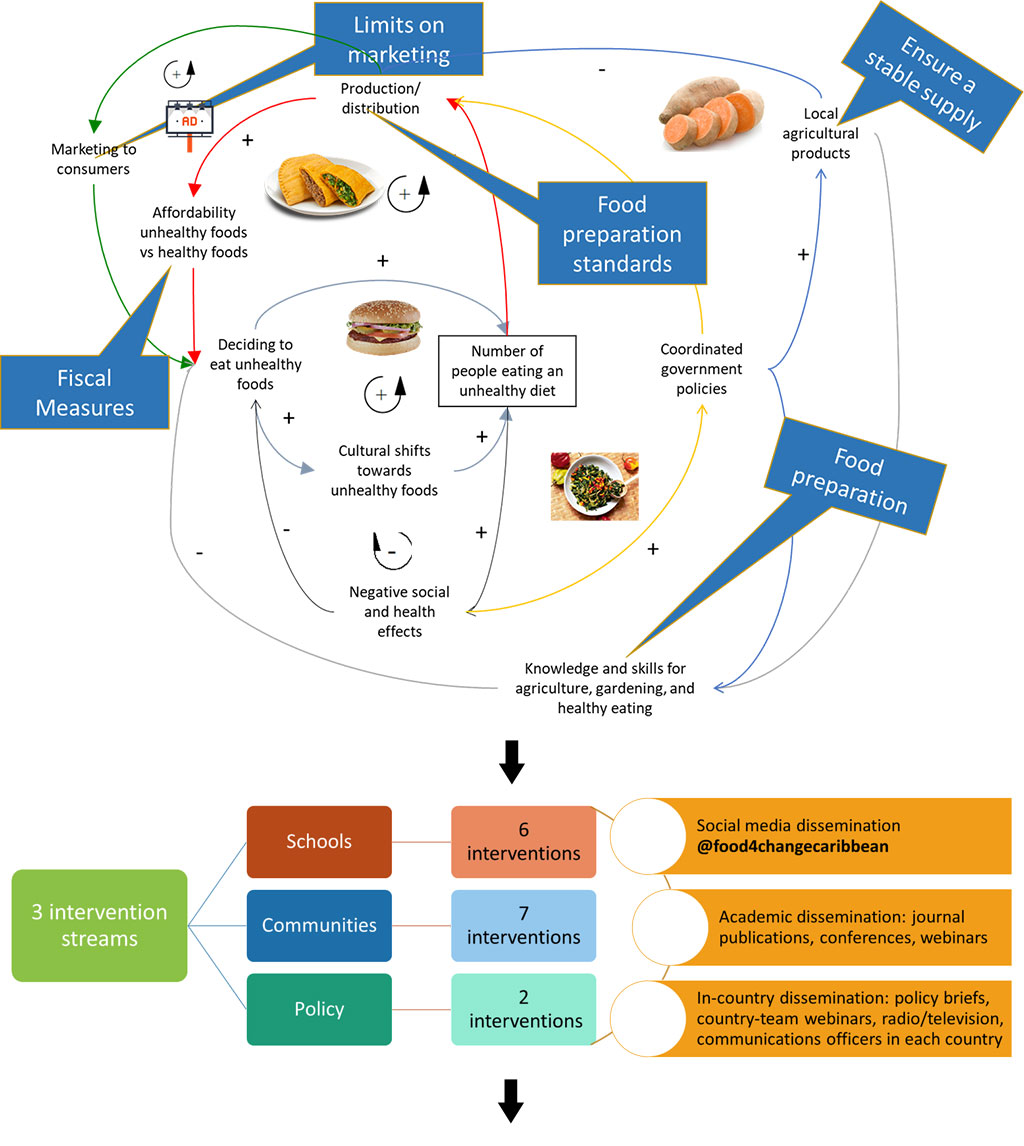Project Summary
With rising rates of non-communicable diseases (NCDs) like diabetes, hypertension, heart disease and stroke, and with the increased instances of childhood obesity in the Americas, the “Improving Household Nutrition Security and Public Health in CARICOM” or Food and Nutrition (FaN) project was started. Funded by the International Development Research Centre (IDRC) in 2018, the FaN project focused on investigating and influencing national food systems to help combat obesity and diet-related NCDs in CARICOM. Under the brand “Food4Change Caribbean”, the FaN team seeks to answer the overarching research question; “What are the most effective, gender-sensitive ways to improve food sovereignty, household food security, and nutrition to reduce the burden of obesity-related NCDs in CARICOM states?”
Through stakeholder interaction, extensive research, and the creation of several wide reaching interventions, the project sought to identify and intervene at key leverage points in the regional food system to improve healthy eating and promote sustainable livelihoods of vulnerable groups in Jamaica, St. Kitts and Nevis and St. Vincent and the Grenadines.
To further build on the lessons learnt, at the end of the project the findings will be packaged for use by other CARICOM member states so that successful, effective interventions can be adapted and implemented.
Objectives
A. Objectives for information collation to identify intervention components
- To describe, by gender, age and socio-economic group, the current nutritional NCD risks in children, women and men, and to investigate what factors influence their food sources and dietary patterns.
- To engage with stakeholders, undertake critical appraisals of available evidence and data, in order to understand how local food systems currently determine the dietary patterns of populations in the three study countries.
B. Objectives to design and assess the intervention packages
- To develop, implement and assess an integrated, adaptable and gender sensitive package of interventions that leverage local food systems to increase healthy eating and sustainable rural livelihoods.
- To work with public, private and civil society partners to expand project impact across the CARICOM region through innovative knowledge sharing, communications and policy action platforms.
Methodology
Objective 1 will be a comparative analysis of existing data sources from each of the three countries to document nutrition related health status and NCD risk factor profiles. This will be complemented by a qualitative study in communities and schools aimed at understanding drivers of consumption and dietary patterns, particularly in relation to gender and socio-economic position.
Objective 2 will gain an understanding of the current food systems, including determinants of availability, access, and prices of baskets of food items, and the potential effectiveness of different types of interventions; stakeholder analysis of key players in the local food systems, including producers, processors, importers, and retailers, within government and private sectors. Key stakeholder interviews will be undertaken to build a picture of the functioning of the food systems from their perspectives, including the political, policy and institutional arrangements that enable or hamper their functioning. A group model building workshops with stakeholders will be causal loop diagrams that represent the local food systems and their relationships to current dietary adequacy and health. These maps will provide the basis for engaging with stakeholders in selecting coordinated gender-sensitive packages of system wide interventions (objective 3).
Objective 3 involves implementing certain follow up actions from POSDEVAL and from F2F. In addition, using the formative work from objectives 1 and 2 to select packages of coordinated interventions within the food systems that are designed to improve diet and nutrition, particularly of women and other vulnerable population groups. Additional interventions will be determined by the findings from objectives 1 and 2.
Objective 4 concerns supporting the dissemination of the lessons learnt from the project, so that successful, effective interventions can be adapted, adopted and implemented in other CARICOM countries, facilitated an online repository of data sources, and platforms for information sharing and training and education. We will disseminate the findings using multiple platforms, and actively promote engagement with multiple stakeholders and their networks. Other CARICOM countries will be targeted, with the aim of promoting food system changes towards improved diets and nutrition.
Overview of Activities




